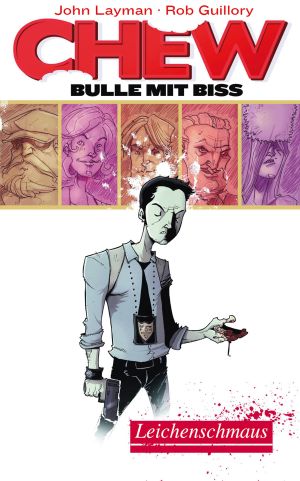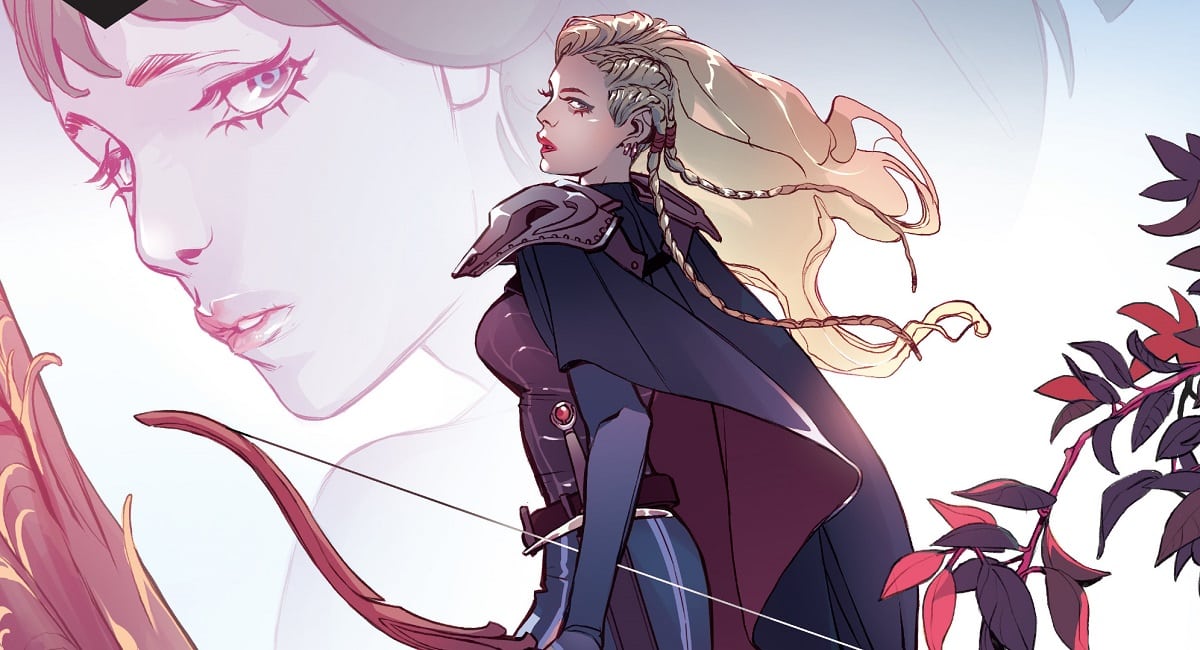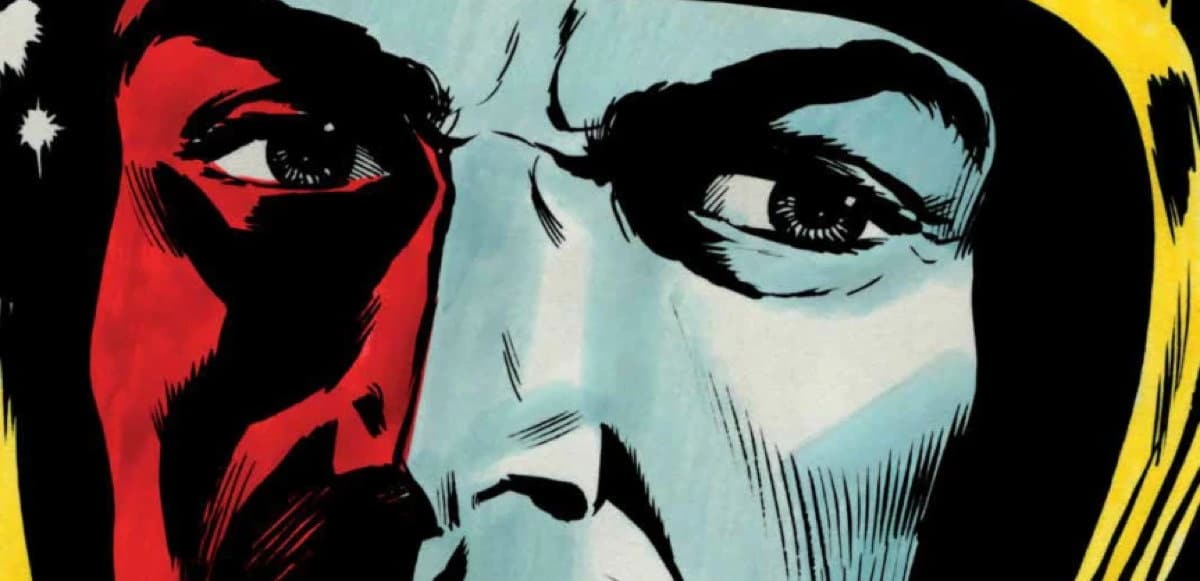John Layman has been around the block in U.S. mainstream comics.
As an editor at Jim Lee’s WildStorm Studios, Layman oversaw influential comics such as Warren Ellis and John Cassaday’s Planetary, Ellis and Cully Hamner’s Red, Joe Casey’s Wildcats Version 3.0 and Mark Millar’s controversial run on The Authority, among others. While at WildStorm, Layman also created and wrote the fantasy blaxploitation miniseries Bay City Jive. Shortly after, he left the company to work as a freelance comics writer for publishers including Marvel, Image, IDW, Dynamite and Oni Press.
In addition to work-for-hire projects like Gambit, Xena and Stephen Colbert’s Tek Jansen, Layman is known for his quirky creator-owned stories. In Puffed!, an Image Comics miniseries with artist Dave Crosland, a boy trapped in a dragon costume is beaten up and left in an after-hours downtown. In Chew, a genre-bending ongoing Image series with artist Rob Guillory, a police officer who gets empathic impressions from whatever he eats is enlisted by the Food and Drug Administration to enforce a poultry prohibition.
One of the most critically and commercially successful independent comic books in recent memory, Chew has repeatedly made the New York Times Best Sellers list and won both the Eisner Award and the Harvey Award for “Best New Series” in 2010.
On the occasion of the German edition of Chew, which recently debuted from Cross Cult Verlag, I had the opportunity to talk to Layman about the series, his prospects in the comics industry and his experiences at WildStorm. An abbreviated and translated version of the interview, which was conducted via e-mail over the course of several weeks, appears in Chew – Bulle mit Biss 1: Leichenschmaus. The book can be purchased here, here or here, among other places. (Disclosure: I’m the translator.)
MARC-OLIVER FRISCH: Do you enjoy eating?
JOHN LAYMAN: I do and I don’t. That is, I’m not a gourmet, and I’m not super particular. I could eat at Taco Bell every day and be happy. I am, however, married to someone I would consider a gourmet and a food enthusiast, and it was through her I sort of discovered that foodies have their own world and interests and language, and are in their own way every bit as passionate and obsessed as comic book fans. Surely that was part of the seeds that inspired Chew.
Since you mention Taco Bell, I presume you’re not a vegetarian. Would you say eating is a guilty pleasure for you, in terms of where the food comes from and what it takes for it to end up on your plate?
Honestly, I think I’m like most Americans in that I try not to think about it too much. I’m not a huge red-meat eater, or a huge meat eater in general, but I am definitely not a vegetarian. I’ve tried it here and there, but I guess my love for bacon and chicken wings outweighs my ethical considerations. I am a weak, weak man.
Not wanting to think about it is probably something many people can relate to. That’s a big part of the “horror” of Chew, right? Tony is constantly forced to think about it. He doesn’t get off the hook as easily as the rest of us.
Is this a question here, Marc? I mean, answer here is obviously yes. Not trying to make Chew a book that preaches, by any means, but if it gets you thinking a bit even as it entertains and amuses, that is certainly a big plus.
Even in our world without cibopaths, it’s not a complete mystery to us where our food comes from and that there’s an industry committed to killing millions of, say, chickens every day so we can eat them. Could we all be Tony Chu, if we just showed more empathy with our environment?
Probably not. I think if we were all Tony Chu, we’d either be vegetarians… or psychopaths. I mean, we can probably try to put ourselves in his shoes, but empathy is not experience, ya know?
What inspired Tony’s ability to experience the origins and sensations of his food?
No idea. Chew had been pitched for so long that I cannot remember the exact inspiration. I can tell you just about every editor and publisher thought Chew was a bad idea. Originally, I wanted to go with Vertigo, because I wanted a page rate, but when I realized nobody was going to buy it, I decided to finance the book myself.
A review in the Boston Gastronauts blog notes that, in Chew, “actually liking what you eat is usually depicted as a character flaw,” and suggests that “any pleasure can lead to your own moral destruction” in the story. Would you agree? Is Tony the hero because he doesn’t succumb to the pleasures that seem to be corrupting everybody else in the book?
If that is true, it was not intentional. The Boston Gastronauts read a lot into their review that I never intended. Or if I did, it was subliminal.
It seems all our little fears about food turn out to be true in Chew: The clerk spitting into your coffee, a booger in your burger, the chef bleeding into the soup—has your work on the series affected your approach to food?
I was a little more aware of it early on in the book. I even tried to be vegetarian for about six months, but it did not take. Mostly, I was aware of it for a while, but eventually fell back into my old bad habits.
Can you walk me through your working process for a typical issue of Chew?
Well, I write an issue, and that takes me anywhere from half a week to two or three weeks, depending on the issue and how much trouble it is giving me. Some issues I have banged out in no time at all, and others are really a wrestling match.
I often write out of sequence, and most times, once I am done, I don’t noodle with scripts or lines, though the fourth story arc I find I’ve been returning to scripts to make tweaks here and there. Rob draws it, and gives me pages several at a time, in black and white lo rez, for me to letter. Once he is done penciling and inking an issue, he colors it up. I take the final finals and paste up the lettering into one Photoshop file.
Rob and I go back and forth on the cover design, though lately I’ve been doing most of it. I design the inside front cover and back cover and do the letters page, and then we give nearly complete issue to Image to put into a document to give to the printer. We give them pretty much a final product. All they add is the bar code and the trademark symbols and the indicia/legalese small print.
It’s kinda a point of pride that Rob and I keep the operation to just the two of us. And we can do it almost monthly… just about a month and a week per issue, most of the time.
The book has a very unique brand of humor. It’s frequently absurd, but never compromises the credibility of the characters and their world or the drama of the story. Is it a concern to you that things might get too silly?
I think the stories will remain grounded for the most part. I have my own set of rules in my head about what will fly, and what will not, even if I can’t (or won’t) articulate them here. I will say that the Poyo stories are the exception to the rule. They seem to get sillier as they go, and Poyo is my vehicle for the thoroughly preposterous “anything goes” issues.
You’ve mentioned that other publishers, including Vertigo, didn’t want Chew. What made it such a hard sell?
Not sure. I’m not a good salesman, and I probably did not make my “cannibal cop/bird flu” book sound as marketable or appealing as it turned out to be. It certainly did not help that Vertigo and DC never really had a lot of respect for WildStorm, so being an ex-WildStorm editor was probably a strike against me from the get-go.
You were at WildStorm from around 1996 through 2003, right? So you were there for what looks like the imprint’s most fruitful period in retrospect, as well as the transition from Image to DC. What’s your perspective on the end of WildStorm?
Actually 1996 through 2001. I worked on some books that developed so slow (Red, for instance) that by the time they saw the light of day I’d been long gone. Mostly I’m sad and bittersweet. It was a truly wonderful job, until WildStorm got bought by DC and it became a nightmare. And other to get Jim Lee on the payroll, I’m not sure why DC bought WildStorm. From my vantage point (granted, a limited one), it seemed like Paul Levitz not only did not “get” WildStorm, but disliked it, and actually worked to thwart its success.
You were the editor of Millar and Quitely’s The Authority, which, from the outside, seemed to be very much in the front line of whatever “creative differences” there were between WildStorm and DC. Can you elaborate on some of the issues?
Paul Levitz hated it, everybody on Earth loved it, and I was stuck in the middle, trying to keep DC happy, trying to keep Mark Millar happy, and trying to make the best book possible. It didn’t exactly do me any favors with long-term career prospects at DC. You’ll notice in 10 years of freelance, it’s one company that has never touched me, so I probably shouldn’t have been surprised when doors were shutting in my face as I was pitching Chew. I’d only be speculating, and lord knows there is enough of that already to be found on the Internet.
DC are planning to integrate the company-owned WildStorm characters completely into their mainstream superhero universe. As someone who was there when many of the more popular WildStorm characters were created, what are your thoughts on that?
I dunno. It’s not really a subject I think about much any more. As far as comics I concentrate on my own things, or on Marvel, where the door has been much more open to me over the years.
I read Bay City Jive the other week, the miniseries you created and wrote at WildStorm in 2001. According to the indicia, the stories and characters belong to DC. Would you have considered this type of deal for Chew, in exchange for a page rate?
Well, you sorta have to with Vertigo. It is not completely creator-owned. Bay City Jive was a tough lesson, giving it over to DC. With Chew, probably the best thing that happened to me is they wouldn’t touch it, because it forced me to self-finance, and now that it is doing well, I control its destiny and reap its rewards. In retrospect, it is absolutely for the best. There is no way Vertigo would have gone for somebody as breezy, fun and non-pretentious as Rob [Guillory].
If Chew was a Vertigo book, it would have ended up dark and somber and ugly and would probably be cancelled by now, or on the road to cancellation. (This is not meant as a slight against all Vertigo books, it’s just clear that they did not get the intended tone of it, and Vertigo is many fine things, but “breezy fun” is not one of them.)
You’ve been at both sides of the table in the industry, as a former editor and now as a freelance creator—from your perspective, do you think it’s possible to get to a point where more unique, off-the-beaten-path books like Chew can thrive in the North American market? What’s the biggest stumbling block?
Finding an audience. I still don’t know how Chew did it, but the weird concept couple with the art made it almost a viral sensation. Females like it, comic-reader guys like to give it to their significant others who don’t usually read comics. And the same for non-comic-book readers… a lot of them are given the book by their comic-book-reader friends as an example of an accessible comic. But really, I think I just got lucky. There are plenty of books every bit as high quality that never strike the same chord with an audience.
Well, it seems like the kind of book that has something to say, about the way we approach our food, but also about some other universal human concerns—our capacity for empathy with each other and with other creatures, our response to authority, the way rules work or don’t work for society. Don’t you think that’s a factor?
Nah, it’s just mostly gross, funny fun. Or, at least, that is its primary appeal.
You’ve mentioned your Marvel work. With Chew taking off like it has, what’s your stance on doing company-owned projects, at this stage?
I’m actually doing three different ones at the moment, for three different companies. Difference is, this time I have a lot more offers than I used to, and I’m a lot more selective about what I take. These are just for fun. Everybody I assumes I am working on a new creator-owned book, and that I should be working on a new creator-owned book. But I am too much of a pessimist. I regard Chew as a huge fluke and aberration, and just assume whatever I do next will flop, just like my previous stuff. And I have no desire to sink whatever profits I make into the sinkhole of a book that does not do well.
I’m surprised to hear that. In issue #1, you cite Kirkman’s call for more creator-owned work as an inspiration to go ahead on your own with Chew, and you sound fairly disillusioned with the work-for-hire arrangement. Kirkman told me work for hire was a hassle to him, so he quit. Is that a prospect you’re considering at all for yourself?
I guess I have not be burned in whatever way Kirkman was. At least, not yet. I’ve got three projects on deck, all of which I accepted for different reasons. One for a big fanboy thrill, and I probably would have written it for free. Another is with an artist I consider a legend. And another is a really high profile gig with Marvel which I took… well, because Marvel has never handed me a high-profile thing that wasn’t me riding on the coattails of some other creator’s event.
I think going into Chew I was disillusioned at the fact I was having to write for money, to survive, and not necessarily projects I’d be if I had the choice. The thing about Chew is it’s given me a lot of choices, opened a lot of doors. And so I am having some fun with that.
I don’t anticipate me becoming too regular a Marvel staple. That is, don’t expect me to sign an exclusive and start writing four books for them at the expense of Chew. First off, I’m not sure Marvel wants me to that extend. Secondly, while I do like superheroes, I like them best in small amounts. I imagine my interest would wane pretty fast if I started writing too much superhero stuff.
Did I understand you correctly that you’re actually not looking to do any more creator-owned books in addition to Chew?
Not until Chew wraps up, or gets closer to wrapping up. Chew takes a lot of my mental idea space, especially since every issue is completely different and self-contained, or attempts to be. I don’t consider myself an especially fast or creative writer, so I’m not sure I have enough upstairs to actually devote to creating and controlling another universe.
Where do you see yourself 10 years from now, as a writer?
Dead. As a writer, and as a human.
—–
Marc-Oliver Frisch writes about comics at his weblog and at Comicgate. You can also follow him on Twitter.









I very much enjoyed reading the interview. I hope The Beat does more like this with talented creators like Layman. I’m glad Chew is such a success as my favorite comics these days are mostly creator-owned. (Yes, Brubaker, I happen to like the word “Creator owned” thank you very much.)
It’s a tough world we live in, I don’t think there’s anyone that can land a top level job of a company like DC or Marvel and not piss off people within the company much less readers.
Best,
Jacob
Tucson, AZ
I originally bought the first Chew TPB after reading a review on Marc’s blog. I, and my daughter, are both now hooked. Probably my favorite book on the stands right now.
Joseph:
Glad to hear you weren’t disappointed.
And yeah, I’d been hoping I’d get to translate CHEW from the day I read the first issue, and it made my day when it finally worked out last year. The book is one of a kind.